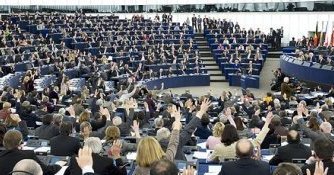The EU is too focused on the executive
The main executive organ is the Council, made up by the governments of the member states. The power of legislation is often still with the Council alone though the number of areas in which co-decision with the European Parliament is applied increased with the Lisbon Treaty. This is particularly evident in some central areas such as competition policy. However, there are the so-called intergovernmental policy areas such as the Common Foreign and Security Policy (CFSP) and the European Security and Defence Policy (ESDP) where the European Union has a say by means of for example the Open Method of Coordination, but this is largely ignored.
Although there are no legislative processes in these areas of policy, they do have a large impact on the three powers. One should also remember that the European Parliament is lacking the traditional rights of a parliament, which is among others the right to initiate policies and to have an unlimited power over the budget. Recently, the Commission has agreed with the Parliament that the rejection of a proposal would need a proper justification. However, a simple complaint at the Luxembourg court would make this invalid, mainly because more power for the Parliament would lead to an institutional imbalance!
Not even the most open Europhiles can deny that the EU is too focused on the executive.
The national parliaments are unable to cope
One of the common arguments is the following: decisions made by the Council of Ministers are authorised by the national parliaments. This is correct. But it is also correct that this method of reasoning has come to its limits. In the Council more and more decisions are made by majority vote (Qualified Majority Voting – QMV). Even if the national representative votes according to the national vote it is possible that decisions are made against the will of the parliamentarians in the member state.
It has to be feared that the European Parliament is not able to fulfil the tasks expected from a normal parliament.
In the same way we have to monitor the European Parliament. Can we grant more rights to this institution? The first argument against would be the excessively federalised voting right as suggested by the German Federal Constitutional Court. As long as the representatives from Malta are in a greater way able to influence decisions than the German representatives, the legitimisation of the Parliament is limited. Otherwise the democratic principle of equal rights would be harmed. Furthermore, one has to remember that the European Union is not a state as such but based on treaties and ruled by its member states. The question should be: Can the national government cut the cord in international law and take its own power without asking its people?
Maybe these arguments can be invalidated somehow. The real problem is different though: it has to be feared that the European Parliament is not able to fulfil the tasks expected from a normal parliament. There are no actual European political parties and within the party groups there are large fractions. You just have to look at the Chinese whispers in committee meetings to get an idea of what is going on. The German Member of the European Parliament talks in official language and the English translator does not understand at all.
The convicted federalist can only smile at these arguments, refer to the developments made and bring forward the safeguarding formula: everything needs time! How much time though? Habermas and his friends have not told us yet.
The European Parliament is lacking the basis in its working to be considered democratic. Cultural differences will stay in place. There is no European public, no common language (English is not spoken by everyone by far!). Associations and political parties will continue to produce elites, but a close contact to the base would without doubt be lost once the European Parliament is strengthened. In the end we can only work on our understanding of the people’s sovereignty but generally speaking the problem remains the same: the EU has a democratic deficit.
Author’s note: Debate is important and not all arguments are necessarily of the author’s opinion.





1. On 11 October 2010 at 14:24, by JG GIRAUD Replying to: Pro/Contra: Does the EU have a democratic deficit? YES!
Replying to: Pro/Contra: Does the EU have a democratic deficit? YES!
Sir , the above article is both right and wrong .
Wright as far as the political democratic deficit is concerned . The low visibility of the EP and the low turn out at elections are sufficient proofs.
Wrong as far as the legal democratic deficit is concerned . Present competences and prerogatives of the EP are comparable - even superior in certain domains - to that of many EU national parliaments . Those competences are actually increasing in the setting up of new Lisbon treaties dispositions .
So that the real problem is the gap between political and legal legitimacy . This gap is narrowing at too low a pace and this is were the real challenge stands . Yours Jean-guy GIRAUD
2. On 12 October 2010 at 22:09, by Jofre M. Rocabert Replying to: Pro/Contra: Does the EU have a democratic deficit? YES!
Replying to: Pro/Contra: Does the EU have a democratic deficit? YES!
Dear Niklas,
I know the arguments you bring into play in your article might not be the ones that the readers of ‘the new federalist’ generally share, but they are, indeed, often employed by Europhobic groups, who try to dismiss the European project while revealing a serious lack of political vision.
I will reply to what I think is one of the main points of your article, when you state that the European parliament can’t be further empowered because it lacks a European political parties and common language. It is true that European integration might have reached the point where no further powers can be transferred without addressing these fundamental questions, if it is to maintain its democratic status.
Those who see this barrier as the end of the European project have their theoretical bases in the thesis of no-demos, announced by Deiter Grimm after the Maastricht treaty. According to this theory, the constitutionalization of Europe, and therefore its democratization, is impossible because there is no European people, and hence no one to support such process, anyone to represent in a representative political system. The lack of a common language and a European public opinion are the symptoms of the inexistence of the European ‘demos’ or people.
The European project has been so far an antidemocratic elitist construction, and even if we cannot deny that, we can seek for ways to turn it upon the people. Habermas, in his ‘Reply to Grimm’ never said that is desirable to give more powers to a representative institution that has no one to represent, what he mainly said is that the European public sphere can emerge with political action, which means, in other words, that the ‘democracy’ can be before the ‘demos’.
It is true that Habermas hasn’t spoke a lot about how much time it takes to spread a common political culture in order to establish a stable base for building up representative democracy, but this is not the real problem. After all, any institution can increase the speed of it change indefinitely.
The real problem is that the policy measures to educate self-conscious European citizens we the union needs to start policies in areas where national states are as sovereign as they once were in monetary policy. This is, nation building policies. We might call it another way, because obviously no one is going to try to lobotomize kids to make them believe that Europe is itself a nation, but essentially, these policies are about awakening the European self-identity. So far, if Erasmus and all the other programs for youth can be seen as one of these policies, their effect has been very limited.
The other big problem about acting politically to increase the political identification of the people with the Union is that is, again, depending on political will, and political will is essentially ideological. The quest for ideology has begun.
3. On 13 October 2010 at 17:43, by Niklas Kramer Replying to: Pro/Contra: Does the EU have a democratic deficit? YES!
Replying to: Pro/Contra: Does the EU have a democratic deficit? YES!
Dear Jofre,
thank you for your good und constructive comment. You have point there, mentioning the need for political will and ideology. Since Iam convinced that european integration is the only answer in todays globalized world, it is probably the only logical conclusion. particular the media, the organisations and the elites are called to be responsible and to look much more ahead there nations´backyard. yet, the fear remains that brussels apparatus doesnot work swimmingly and that there are drawbacks. so while being committed to a federalist vision of a united europe, we always have to look for solutions, which are compatible to the heterogenity we have. subsidiarity would be the catchword here.
Follow the comments: |
|
